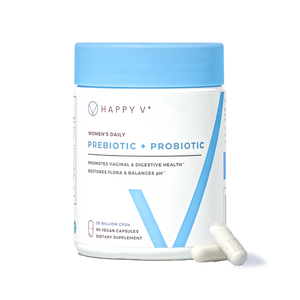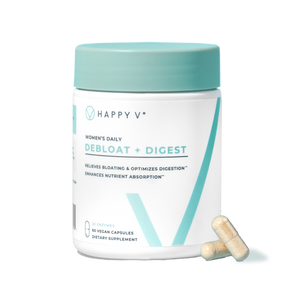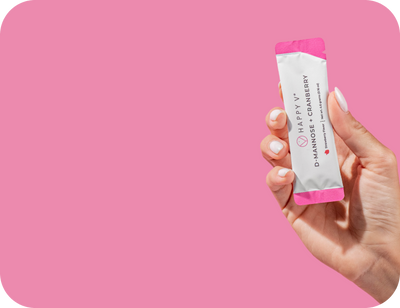- Fact Checked
- October 17, 2025
- 16 min read
Cranberry for UTI Prevention: What the Science Shows
Table of Contents
Table of Contents

Cranberries have earned a reputation as the go-to natural fix for urinary tract infections (UTIs), but is that reputation actually rooted in science?
The short answer is… kind of. But not in the way most people think. While cranberry juice has been praised for decades, research shows it's not actually all that effective in preventing UTIs. That's because cranberry's power comes from specific compounds called proanthocyanidins (PACs), which help keep bacteria like Escherichia coli (E. coli) from sticking to your urinary tract in the first place, and cranberries are stripped of these PACs in the traditional juicing process.
Whole-fruit cranberry powders like Pacran®, on the other hand, retain these PACs and have demonstrated real promise in reducing recurrent urinary tract infections. While this may not be enough to replace antibiotics for treating an active UTI, it can be an effective supporting player in a urinary health routine to prevent future infections, especially when combined with D-Mannose.
This post is for informational purposes only and does not constitute medical advice. See full disclaimer below.
What About Cranberries Actually Fights UTIs

Cranberries contain a unique compound called proanthocyanidins (or PACs for short) that are believed to fight UTIs by preventing infection-causing bacteria like E. coli from sticking to the walls of the urinary tract. When infection-causing bacteria can't stick to the urinary tract lining, they can't multiply, group together, and form persisting infections.
Other compounds in cranberries, like fructose, may inhibit other types of bacterial adhesion, but when it comes to UTIs, E. coli is the biggest player.
In fact, one lab study on bladder and vaginal cells found that the cranberry powder Pacran® decreased the mean adhesion of E. coli to vaginal epithelial cells from 18.6 bacteria per cell down to just 1.8 (p < 0.001). For non math-lovers out there, that's a 90% reduction!
Why Cranberry Juice Doesn't Work

While cranberry and certain cranberry products have a lot of promising scientific evidence, traditional cranberry juices have not shown to be effective for UTI prevention. Why? Well, it's not any one reason, but a combination of factors, including:
What's Lost in the Juicing Process
Most cranberry juices you find in the grocery story are heavily diluted and filled with added sugars. In the dilution process, the fibers, organic acids, and PACs that make cranberries so powerful are lost. More than that, added sugars are bad bacteria's favorite food, which means they can actually fuel the growth of infection-causing E. coli, not curb it.
Inconsistent Potency and Standardization
Since cranberry juices are often made from concentrates, that means the potency and quality varies from batch to batch, making it hard to know if you are actually getting all the beneficial compounds you need to prevent UTIs. This is why most women with recurrent UTIs opt for a cranberry supplement with standardized dosing.
In one study, a 500 mg capsule of standardized cranberry powder outperformed a 10-ounce serving of 27% cranberry juice concentrate in preventing bacterial adhesion, and this was despite the juice claiming to contain nearly 20 times more PACs (38 mg vs. 2 mg). This highlights that it's not just how much cranberry you take, but how it's processed and delivered that truly determines its effectiveness.
Impractical Form for Daily Use
The most comprehensive analysis of cranberry juice for UTI came as part of the Cochrane Database of Systematic Reviews, which analyzed 24 studies involving 4,473 participants comparing cranberry products (juice, tablets, capsules) with placebo or standard care for UTI prevention.
In the end, the Cochrane review recommended against cranberry juice for UTI prevention not only because it didn't find it to be effective, but because 55% of study participants in juice trials actually dropped out because they couldn't tolerate the taste or the volume they had to drink. Basically, even if juice could help prevent UTIs (which science shows it really doesn't), most people can't actually incorporate it into their daily routines to enjoy the benefits.
Why Cranberry Powder Works Better

While studies about cranberry juice are disappointing, cranberry products should not be written off altogether. The studies relating to cranberry powders for the prevention of urinary tract infections tell a much different story. The two critical factors that contributed to these results are:
Standardization
Research suggests that taking 36 mg of cranberry PACs per day (typically delivered in two doses—morning and evening) is what's needed to actually prevent E. coli from sticking to the urinary tract. The best way to guarantee effective dosing is through high quality whole cranberry powders whose PACs stay consistent from capsule to capsule.
Whole fruit formulation
While it may seem like more of the cranberry is lost in the supplementation process than in the juicing process, this isn't true. Cranberry powders use a whole juice formulation, which means they preserve all the important fibers and compounds—the active ingredients that make cranberries so effective against UTI development.
Which Cranberry Powders Work Best?
As with any supplement, when choosing a cranberry powder, you have to be, well, choosy. Not all products deliver the same results. In fact, among whole cranberry fruit powder, Pacran® stands out as the most thoroughly studied and clinically supported form.
Pacran® is made from the entire cranberry fruit, including the skin, pulp, juice, and seeds, and is standardized for proanthocyanidin (PAC) content to ensure each dose has consistent potency.
In a six-month clinical trial led by Vidlar et al. (2015), 176 women aged 18–60 with a history of recurrent UTIs took either 500 mg of Pacran® daily or a placebo. The results were striking, to say the least. Only 10.8% of women in the cranberry group experienced a UTI compared to 25.8% in the placebo group. That's a 58% reduction in the risk of UTIs (p = 0.04)! Women taking Pacran® also went significantly longer before their first UTI occurred.
A separate 90-day study by Sengupta et al. (2011) confirmed similar results. Women who took either 500 mg or 1,000 mg of standardized cranberry powder daily saw up to a 36% reduction in urinary E. coli infections, and both doses were found to be safe and well-tolerated, with the most common side effect being mild digestive discomfort.
Which Populations Don't Benefit from Cranberry
The Cochrane review (which, you'll remember, examined 24 studies with almost 4500 total participants) also examined specific populations of people to see if cranberry worked better for certain groups. Turns out, it does. Results from these systematic reviews consistently showed that cranberry didn't help:
- Older people/Elderly people: Not effective (risk ratio 0.75)
- Pregnant women: Not effective (risk ratio 1.04)
- Children: Not effective (risk ratio 0.48)
- People with catheters or bladder dysfunction: Not effective (risk ratio 0.95)
This means that, for these populations, the evidence does not support using cranberry for UTI prevention. These findings are important for healthcare providers working in primary care and urology to understand when recommending cranberry products to patients.
How Cranberry Compares to Other UTI Prevention Approaches

So there's evidence that whole cranberry powders, and especially Pacran®, can help reduce the risk of future UTIs. But how does it stack up against other popular approaches?
Cranberry vs. Antibiotics
When it comes to treating an active UTI, antibiotics are the gold standard and, more than that, they're often essential to clear the infection. So if your doctor ever recommends antibiotics for a current UTI, take them exactly as prescribed.
When it comes to preventing future infections, though, some people with recurrent UTIs face the question of whether they should use prophylactic or preventive antibiotics or explore alternatives, like cranberry powders.
Studies comparing cranberry to low-dose prophylactic antibiotics (specifically the antibiotic trimethoprim) found that cranberry products were equally as effective as antibiotics in reducing repeat UTI risk, so it's definitely worth talking about with your doctor, particularly if you are concerned about antibiotic resistance. When talking with them, make sure to come up with a plan about what to do if you are still getting recurrent UTIs while taking cranberry powders. That may be your sign to try preventative antibiotics.
Cranberry vs. Probiotics
Probiotics, especially Lactobacillus strains like L. rhamnosus GR-1 and L. reuteri RC-14, are another tool people often turn to for urinary tract health. These friendly bacteria crowd out harmful microbes and also produce natural antibacterial compounds that make it harder for pathogens like E. coli to thrive.
When it comes to UTI prevention, though, the research on probiotics alone is mixed. Two studies directly comparing cranberry to probiotic treatment found that cranberry performed better at reducing recurrent UTIs.
This suggests that probiotics should not be used as the only natural prevention method, but perhaps be combined with cranberry. In fact, combining cranberry with probiotics may make for more effective prevention. Cranberry can help prevent bacteria from attaching to the bladder wall and urethra, while probiotics can help rebuild and maintain a healthy vaginal environment that keeps bad bacteria from coming back.
Cranberry vs. D-Mannose
While most people put cranberry and D-Mannose head-to-head, the truth is, like probiotics, they're more powerful together than they are apart.
While PACs prevent the infection-causing bacteria from adhering to the urinary tract in the first place, D-Mannose, a naturally occurring simple sugar, has been shown to bind to E. coli that has adhered to the urinary walls and help remove it. In one clinical trial, Kranjčec et al. (2013) studied 308 women with recurrent urinary tract infection over six months. The results showed that D-mannose powder was just as effective as nitrofurantoin (a common antibiotic) for preventing recurrent UTIs, but with far fewer side effects than antibiotics. Another study by Porru et al. (2014) found that D-mannose extended the average time to recurrence to 200 days, compared to just 52.7 days with antibiotics. That's nearly four times longer between infections, with none of the harmful side effects of antibiotics!
This one-two punch approach (cranberry stops bad bacteria from attaching, the other helps actively remove it) is why Happy V combines Pacran® with D-Mannose in both its UTI preventing capsules and powder. Same clinically proven ingredients in two different forms, so you can choose the one that best suits your lifestyle (because remember, consistency matters).
D-Mannose + Cranberry
Supports urinary tract health and promotes long-term wellness.
Other Natural Approaches Worth Mentioning
Given how common UTIs are (a majority of women will experience at least one in their lifetime), there have been a lot of studies on how to prevent them. Two other natural approaches with some promising science include:
- Vitamin C: A study in pregnant women found that 100 mg of ascorbic acid daily significantly reduced UTI incidence (12.7% vs. 29.1% in controls). Vitamin C may work by creating an acidic urine environment unfavorable for pathogens.
- Roselle (Hibiscus sabdariffa): Sometimes called "Florida cranberry," roselle has shown promise in preliminary studies. One clinical trial in long-term care facilities found a 36% decreased incidence of UTI in residents taking roselle drink. A randomized clinical study found roselle combined with Boswellia serrata reduced UTI symptoms and recurrence similarly to antibiotic treatment.
Hydration and Lifestyle Practices

While supplements like cranberry and D-mannose can play a big role in UTI prevention, they work best when combined with healthy daily habits. Lifestyle choices have a direct impact on urinary health, and even small changes can make a big difference in preventing infections.
Good urinary health starts with the basics: practices that help flush out bacteria, maintain balance, and reduce irritation. The best practices for UTI prevention are:
- Stay hydrated. Drink plenty of water (think: 6-8 glasses) throughout the day to help flush bacteria out of the urinary tract.
- Don't hold it. Urinate regularly instead of waiting long periods between bathroom breaks.
- Practice good hygiene. Always wipe front to back and avoid harsh soaps or scented products that can disrupt the vaginal microbiome.
- Urinate after sex. This helps clear out any bacteria that may have been introduced during intercourse.
- Wear breathable fabrics. Choose cotton underwear and avoid tight clothing that traps moisture.
- Support your microbiome. Combine these habits with probiotics and cranberry supplements for added protection.
When these foundational habits are paired with science-backed supplements like Happy V's D-Mannose + Cranberry, you get a comprehensive, proactive approach to UTI prevention.
Frequently Asked Questions About Cranberry and UTIs
Can cranberry cure an active UTI?
Cranberry is not a treatment for active urinary tract infections. If you have a symptomatic UTI with painful urination, back pain, the frequent urge to "go", or other concerning symptoms, you likely need provider-prescribed antibiotics to clear the infection and feel comfortable again. Cranberry products are intended for the prevention of recurrent UTIs, not the treatment of active infections.
How long does it take to see results from cranberry supplements?
Honestly, it depends. Cranberry is not a quick fix. It's intended as a long-term preventive strategy for people with a history of recurrent infections. In clinical trials, participants took cranberry supplements consistently for 6 months or longer to see measurable reductions in UTI recurrence. As with anything related to health, consistency is key.
Are there any side effects from cranberry supplements?
Cranberry products are generally well-tolerated. However, some people may experience gastrointestinal side effects like mild stomach upset or nausea. If you're taking blood thinners like warfarin, consult your healthcare provider before taking cranberry supplements, as there may be interactions. People with a history of kidney stones or certain medical conditions should also discuss cranberry use with their doctor.
Is cranberry juice effective if I drink enough of it?
Likely no. The Cochrane systematic review found that cranberry juice was not effective for UTI prevention compared to placebo or water, even across multiple large studies. More than that, drinking large quantities of cranberry juice often increases your daily sugar intact, which carries its own health concerns.
How do I choose a cranberry capsule?
Good question! The most effective cranberry supplements—whether you choose cranberry capsules, cranberry tablets, or cranberry pills—use whole cranberry fruit powder (skin, pulp, juice, and seeds) that is standardized to ensure consistent active compound levels. When you're choosing a supplement, look for cranberry extract products that clearly state they're standardized and ideally backed by clinical research on that exact formulation.
All of Happy V's cranberry supplements use Pacran®, a clinically studied whole cranberry fruit powder. Each serving provides 500 mg of standardized whole-fruit cranberry powder (which is the same dose shown in clinical trials to help reduce recurrent UTIs). Pacran® has also been tested in multiple RCTs (randomized controlled trials) for both safety and effectiveness, so you can feel confident you're getting a safe product that's supported by science, not just marketing claims or grocery-store guesses.
Can I combine cranberry with other supplements?
Yes! In fact, many people combine cranberry with D-mannose and/or probiotics for multi-pronged support. Just be sure to consult with your healthcare provider before taking any new supplement, even ones that are natural, especially if you're taking any medications.
Is cranberry safe long-term?
Current clinical studies show that cranberry supplements are safe for 6-month periods. This doesn't mean they aren't safe to take for longer than that; it just hasn't been studied. For longer term use, have a conversation with your healthcare provider.
What if I'm still getting recurrent UTIs despite taking cranberry?
It's important to remember cranberry is not a cure-all. If you're still getting UTIs even after taking a high-quality cranberry supplement regularly, there might be other factors at play. It's worth talking with your healthcare provider, since recurrent infections can sometimes point to underlying issues that need a closer look. Your doctor might recommend additional testing or even short-term preventive antibiotics if needed. Think of cranberry as one part of a bigger urinary health plan, not the whole story.
Research Gaps and Future Directions
Even though this guide reflects the best available science, there's still a lot we're learning about cranberry and urinary health. The study design of future research will need to address some of the most important questions researchers are still working to answer, including:
- Optimal dosing. 500 mg daily looks promising, but we don't yet know if higher or lower doses might work just as well.
- Best formulation. It's still unclear which combination of cranberry's natural components (like the skin, pulp, and seeds) delivers the most benefit.
- Duration of use. How long should someone take cranberry before knowing if it's truly helping?
- Individual factors. Why does cranberry seem to work great for some people, but not others?
- Specific populations. More studies are needed in groups like older adults, children, and people with bladder dysfunction.
- Combination therapies. We're still learning how cranberry interacts with other supportive ingredients like D-mannose, probiotics, and lifestyle habits through meta-analysis and systematic reviews.
The good news? Research in this area is moving fast, and Happy V is keeping a close eye on it. As new studies come out and the science evolves, we'll continue updating this guide (and our formulas!) to make sure it reflects the most accurate, up-to-date information on how to use cranberry safely and effectively for UTI prevention.
Final Thoughts
Cranberry remains one of the most extensively studied natural remedies for UTI prevention, but its benefits depend heavily on the form you choose and how consistently you use it. The science is pretty clear that store-bought cranberry juice isn't going to cut it, but standardized whole-fruit cranberry powders like Pacran® have shown real benefits for women who deal with recurrent infections.
That said, cranberry isn't a silver bullet. It works best as part of a broader wellness and public health approach that includes staying hydrated, practicing good hygiene, and consulting a healthcare provider about any recurring symptoms. When used wisely and consistently, cranberry products can be a valuable tool in maintaining urinary health.
Keep the Conversation Going
- Visit our blog for more on BV treatment options and women's health tips.
- Join our private Happy V Facebook group to hear from others who've been there.
- Explore supplements designed to support your vaginal health journey.
Disclaimer: This blog is for informational and educational purposes only and is not intended to diagnose, treat, cure, or prevent any disease. Statements about supplements have not been evaluated by the Food and Drug Administration. For more information about vaginal infections, visit the CDC or speak to a licensed healthcare provider.













